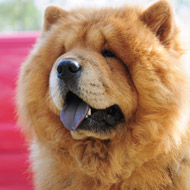
Decision follows discussion with breed representatives
The Kennel Club has reclassified the chow chow from category three to category two of its Breed Watch system.
The reclassification, which comes into immediate effect, means that chow chow 'best of breed' winners, or those winning their third challenge certificate, will no longer require a veterinary health check at championship shows.
The decision follows a recommendation from the Kennel Club Dog Health Group, which has been following the health of the breed and discussing the health initiatives with a chow chow representative.
“The chow chow community has demonstrated to the Kennel Club their dedication to ensuring involvement in all health initiatives undertaken for the breed and we’ve seen a clear improvement in the health of the Chow Chow,” explained Caroline Kisko, Kennel Club secretary.
“Whenever a breed is moved from category three to category two, those involved in the breed remain dedicated to improving their health even further, as they share the Kennel Club’s goal of improving the health and welfare of pedigree dogs. This is something that never stops.”
The Kennel Club’s Breed Watch serves as an 'early warning system' to identify points of concern for individual breeds of pedigree dog. Its primary purpose is to enable anyone involved in the world of dogs to find out about any breed specific conformational issues which may lead to health problems.
The Kennel Club says that it will continue to track the health of the chow chow, and the breed health coordinator will still be required to submit a breed health report. Judges will also continue to submit mandatory health monitoring forms following each championship appointment.
For more information on Breed Watch and the guidance given to category three breeds, visit thekennelclub.org.uk.



 The Animal and Plant Health Agency (APHA) has updated its online reporting service for dead wild birds.
The Animal and Plant Health Agency (APHA) has updated its online reporting service for dead wild birds.